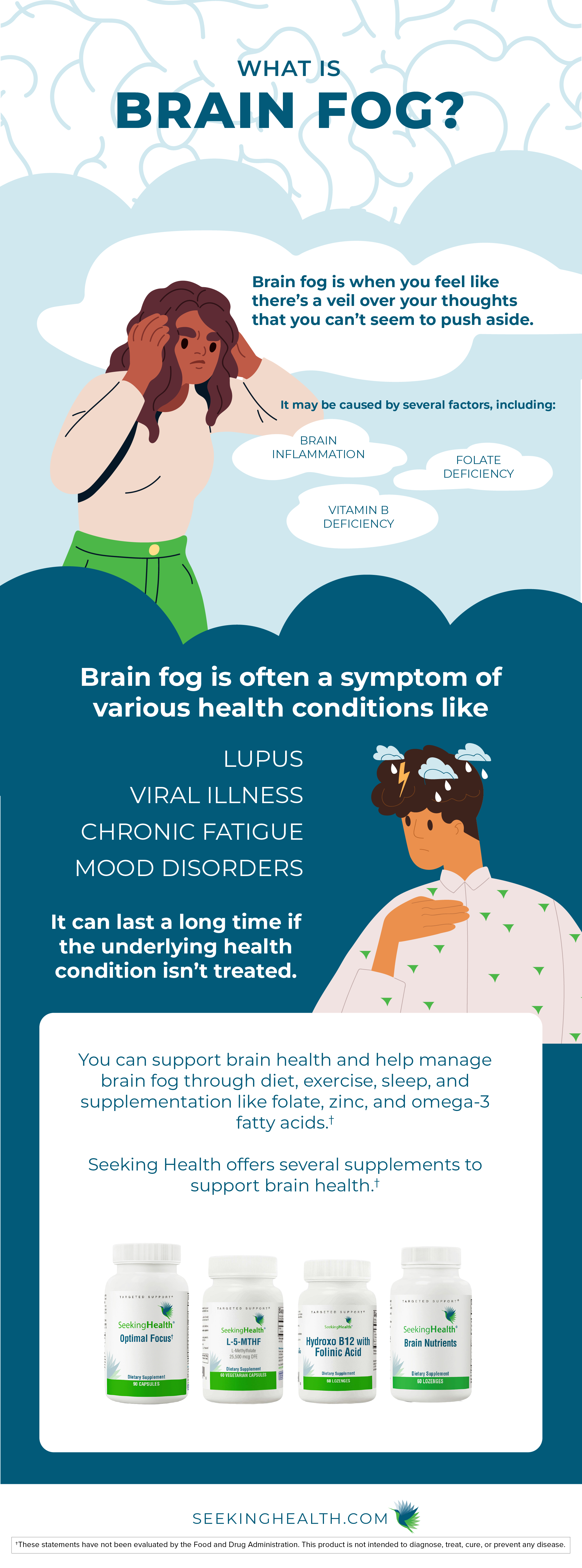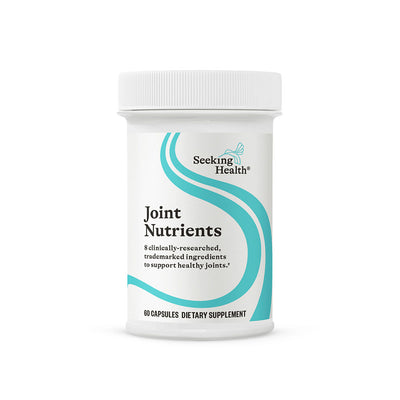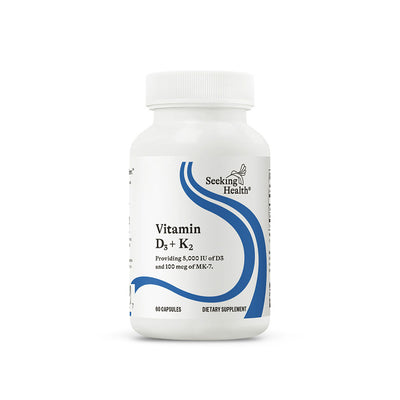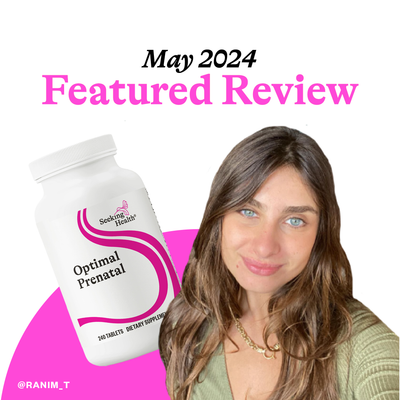Are you struggling to wrap your brain around the simplest ideas and feeling motivated? Do you feel like the right word is always just out of reach? Do you feel overwhelmed by making the simplest of decisions, planning and organizing tasks, or speaking in a coherent sentence?
You may be experiencing brain fog.
The longer your brain fog lasts, the more tired and defeated you may feel—and then the fog worsens. It's a vicious cycle.
But you can break the cycle. You just need to understand more about brain fog to take the right steps to eliminate it and help prevent it from occurring. From treating disease and eating healthy to managing stress and taking supplements like Seeking Health offers, you can get the upper hand on your brain fog.
And guess what? You've already started today by choosing to continue reading!

What Is Brain Fog?
Brain fog is when you feel like there’s a veil over your thoughts that you can’t seem to push aside. You may feel unmotivated and sluggish, have problems sleeping, can’t focus and concentrate, and feel out of sorts. You may also find yourself struggling with the following thoughts in the midst of a thick, pea soup fog:(1)
- I lose track of what I am going to say
- I am forgetful
- I have trouble concentrating
- I have trouble focusing on the things I want to do
- I am easily confused
- It is hard for me to make up my mind and reach a decision
We all may experience brain fog throughout our lives after eating poorly, not getting enough rest, experiencing stress, or being sick. It usually goes away after you take it easy for a day or two. But sometimes, the fog thickens to the point where you may start thinking you’re losing your mind.
You’re not. You just need to understand what’s going on and what you can do to fix it.
What Causes Brain Fog?

The jury’s still out on what causes brain fog exactly. We know what triggers it, but not exactly what’s happening in the brain that gives you that pervasive fuzzy feeling.
Brain fog is symptomatic of a laundry list of common health conditions:
- Viral illness. You may be one of almost 93% of those who’ve had a viral illness who may experience brain fog as a chronic symptom.(2)
- Lupus. Brain fog is a common complaint, especially during a lupus flare. You may also have antiphospholipid antibodies, which are linked to brain fog, too.(3)
- Chronic fatigue syndrome. Brain fog is a pervasive symptom of chronic fatigue syndrome and its accompanying conditions like postural tachycardia syndrome (POTS) and decreased blood flow to the brain.(4)
- Autoimmunity and chronic pain. If you have rheumatoid arthritis or fibromyalgia, you may be one of up to 40% of those who suffer from brain fog.(5)
- Hypothyroidism. If you have hypothyroidism, you may have brain fog, too. It may have to do with inflammation, oxidative stress, and autoimmunity.(6)
- Gluten sensitivity. If you have gluten intolerance or celiac disease, you may have brain fog. The good news is that it seems to lift after about 12 months of sticking to a restrictive diet.(7)
- Stress. You may be studying or working too hard, caring for a sick relative, or experiencing other trials and tribulations for an extended period, resulting in increased stress and brain fog. Stress always has a ticket to get in!
- Hormones. Menopause and brain fog sometimes go hand-in-hand. If you are going through the change, you may be in the good company of others who often note changes in memory.(8)
- Unease and low mood. More and more of us are showing the toll the uncertainties and pace of life can take. As a result, up to 60% of us experiencing low mood also have brain fog.(9,10 )
Experts aren’t exactly clear on what’s happening in the brain when it gets foggy. However, it may occur due to the following:
| Inflammation. Inflammatory markers like histamines may get released into mast cells causing, brain inflammation.(11) Mast cells are immune cells that help to fight infection and allergic reactions. But, while they are generally anti-inflammatory, they can also cause it. |
| Vitamins B6 and B12 deficiencies.You may be prone to brain fog and depression if you’re B6 or B12 deficient.(12) Vitamins B6 (pyridoxine) and B12 (cobalamin) are important for methylation, responsible for keeping your brain, and nervous and immune systems healthy. |
| Low serum folate levels.You may be at risk of developing brain fog if you don’t get enough natural folate.(13) However, don’t take a synthetic folic acid supplement! It can block folate receptors, so you can’t get enough, especially if you have an MTHFR gene polymorphism.† |
| High homocysteine blood levels.If you develop hyperhomocysteinemia, where you have way too much homocysteine in your blood, you may be at risk of developing cognitive impairment.(14) |
How Long Can Brain Fog Last?
It’s hard to say how long you’ll experience brain fog—it depends on the underlying condition. Your brain fog may be temporary and improve on its own once the underlying cause is addressed. Sometimes, a little self-care can provide relief within a few days.
But if you have an underlying, undiagnosed health condition, it may feel like the fog never lifts, no matter how many trips to the spa you make. Unfortunately, it may last for weeks or months. And realizing how much money you’ve been spending on saunas and massages may make you feel worse!
Fortunately, your healthcare practitioner can investigate the cause. Once you get a diagnosis, you can start working on treating your brain fog.
How Do You Get Rid of Brain Fog?

| Getting enough sleep each night, depending on your age.(15) | Drinking enough water throughout the day, about 8 to 11 cups.(16) | Eating a well-balanced diet loaded with whole foods and, leafy greens and skipping processed foods. |
| Limiting or eliminating caffeine and sugar. |
Exercising regularly, about 150 minutes per week or 30 minutes a day.(17) |
Managing stress and prioritizing mental health. Seek therapy when needed! |
Speaking with your healthcare practitioner about how you are feeling may uncover an undiagnosed health problem. It may be the reason why your thoughts seem muddled all the time.
Once your practitioner checks your health, they may suggest various supplements to support brain health and cognition.(18) They can tell you if they will interact with any medications you may be taking. These supplements may include:†
- Zinc: Zinc can help support a healthy immune system and metabolism. It also allows you to create synapses between your nerves. It may even support memory and cognitive development.
- Polyphenols: Polyphenols include flavonoids, tannic acid, and ellagitannin found in foods like spinach, flax seed, apples, berries, and guess what else? Dark chocolate! They act as antioxidants to combat oxidative stress.
- Omega-3 fatty acids: Omega-3s are healthy fats in seafood like salmon and mackerel and some plants like Brussels sprouts and walnuts. They help with cell function and are found in high amounts in your brain.
- Probiotics: These microorganisms can help support gut health which can help digestion and support healthy inflammation levels through the gut-grain axis. They can also support cognitive function and spatial memory.
- Folate: Again, NOT folic acid! Folate—specifically L-methylfolate—supports the methylation process and gene expression. Efficient methylation is designed to support healthy brain development and function. This is also important if you have a MTHFR polymorphism and have difficulty using folate.
- Glutathione: Glutathione supports a healthy reaction to oxidative stress in the body like an antioxidant. In fact, it is one of the most vital substances your body needs. If you don’t have enough, you may experience cognitive issues, especially as you age.(19)
Where you can find these supplements? Well, you’ve come to the right place!
Seeking Health’s Cognitive Support Supplements†
Seeking Health has several brain health supplements available to ensure you always get the cognitive support you need. We’ve designed our supplements to include nutrients supporting brain function, providing antioxidants, and fostering a healthy inflammatory response. If you take the proper nutrients, you’ll help promote healthy cognitive performance and mental health.†
- L-5-MTHF is folate in its bioavailable form. It was created to support healthy methylation. These capsules are easily absorbed and are the only form of folate that can cross the blood-brain barrier.
- Brain Nutrients contain key ingredients such as Emothion™ (S-Acetyl-L-Glutathione), thiamine, and zinc to support a healthy response to oxidative stress and support normal brain function.
- Hydroxo B12 with Folinic Acid contains potent methyl-free B12 and folate to support healthy homocysteine levels, energy, and cognition.
- Optimal Focus combines ingredients like citicoline, huperzine, American ginseng, and docosahexaenoic acid (DHA) to promote clarity, focus, and learning.
The Bottom Line

Brain fog can be a debilitating symptom of many health problems. It may happen when your autoimmune disease is flaring or because you lack critical nutrients. Brain fog may last several days, weeks, or even months. Sometimes, a good night’s sleep or quality downtime can make things right. Other times, you may need a healthcare intervention.
There are things you can do in support of keeping your brain healthy and your cognition intact. You may have to make lifestyle or dietary changes, manage any underlying illness, or exercise more. Your healthcare practitioner may also suggest incorporating nutrient-rich supplements into your daily routine, including several Seeking Health offers. We’ve got your back—and your brain!
References
- https://pubmed.ncbi.nlm.nih.gov/38079429/
- https://pubmed.ncbi.nlm.nih.gov/34672377/
- https://pubmed.ncbi.nlm.nih.gov/27708976/
- https://pubmed.ncbi.nlm.nih.gov/23576989/
- https://pubmed.ncbi.nlm.nih.gov/37441085/
- https://pubmed.ncbi.nlm.nih.gov/35414261/
- https://pubmed.ncbi.nlm.nih.gov/36555205/
- https://www.ncbi.nlm.nih.gov/pmc/articles/PMC6784846/
- https://www.nami.org/Blogs/NAMI-Blog/January-2018/The-Comorbidity-of-Anxiety-and-Depression
- https://pubmed.ncbi.nlm.nih.gov/16571468/
- https://pubmed.ncbi.nlm.nih.gov/26190965/
- https://pubmed.ncbi.nlm.nih.gov/22739363/
- https://pubmed.ncbi.nlm.nih.gov/35584808/
- https://pubmed.ncbi.nlm.nih.gov/17709448/
- https://www.cdc.gov/sleep/about_sleep/how_much_sleep.html
- https://www.mayoclinic.org/healthy-lifestyle/nutrition-and-healthy-eating/in-depth/water/art-20044256#:~:text=So%20how%20much%20fluid%20does,fluids%20a%20day%20for%20women
- https://www.cdc.gov/physicalactivity/basics/adults/index.htm
- https://www.ncbi.nlm.nih.gov/pmc/articles/PMC7911739/
- https://pubmed.ncbi.nlm.nih.gov/34065042/
† These statements have not been evaluated by the Food and Drug Administration (FDA). This product is not intended to diagnose, treat, cure, or prevent any disease.












